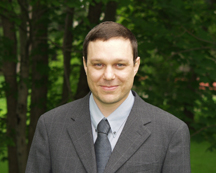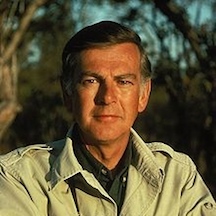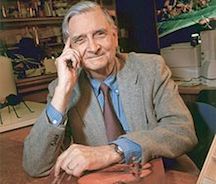 Evolution
Evolution
 Faith & Science
Faith & Science
Loeb, Johanson, Wilson: Leading Scientists Bloviate on What Nobody Knows
 Nobody knows scientifically if aliens exist. Nobody knows scientifically what the meaning of life is, or the true content of morality. When scientists speculate on such things, their opinions may be interesting — after all, they are smart people — or maybe not. However they have left science behind, not that that serves as a discouragement in some quarters. The scientist’s only advantage may lie in the sophistication of his ignorance.
Nobody knows scientifically if aliens exist. Nobody knows scientifically what the meaning of life is, or the true content of morality. When scientists speculate on such things, their opinions may be interesting — after all, they are smart people — or maybe not. However they have left science behind, not that that serves as a discouragement in some quarters. The scientist’s only advantage may lie in the sophistication of his ignorance.
Nevertheless, when it comes to ultimate questions, the media are infatuated by the fact-free speculations of Darwinian evolutionists. Here are three leading scientists in different fields who were handed an open mike and encouraged to pontificate.
SETI: Avi Loeb
Harvard astronomer Avi Loeb is “caught up in the thrill of the search” for alien life, according to the Harvard Gazette. Correspondent Edward Mason captures the essence of his feelings:
The question of whether we’re alone has the potential to reshape almost every facet of human knowledge, with implications in biology, history, linguistics, politics, and much more. Our religious beliefs would be challenged. (Emphasis added.)
 Loeb would be delighted to board an alien spaceship and learn from beings probably wiser than any human. He would ask them what’s the nature of dark matter and dark energy, which no scientist today comprehends. “We should simply check our assumptions rather than make them, especially in the search for intelligent life,” he agrees, but then speculates that aliens may inhabit the cold, dark objects of the Kuiper Belt, beyond Neptune.
Loeb would be delighted to board an alien spaceship and learn from beings probably wiser than any human. He would ask them what’s the nature of dark matter and dark energy, which no scientist today comprehends. “We should simply check our assumptions rather than make them, especially in the search for intelligent life,” he agrees, but then speculates that aliens may inhabit the cold, dark objects of the Kuiper Belt, beyond Neptune.
As for why he thinks religious beliefs would be challenged, in particular, and not other belief systems, that is not explained. He seems assume that theists would have to adjust to explaining other beings that evolved. What if (while we’re speculating), the aliens came to announce to us humans that all life in the universe was intelligently designed?
Paleoanthropology: Donald Johanson
On the 40th anniversary of his discovery of the widely publicized “Lucy” skeleton (Australopithecus afarensis), Donald Johanson was given an ultra-friendly interview in the L.A. Times by reporter Deborah Netburn. Despite the controversial nature of his famous fossil and its interpretation (see analysis by Casey Luskin here), Johanson was given the opportunity to tell how he “hopes to find out what makes us human.”
At the Institute of Human Origins we are working to answer the specific question: What are the evolutionary foundations of modern humans?
The features that distinguish us from all other animals are symbolic language, our cooperation, and a culture that allows us to make cumulative developments that no single individual could make alone. So, how did all of that come about?
This after he stated emphatically that his fragmentary fossil, found scattered all over a hillside, was the key to understanding humanity:
She shifted, very dramatically, anthropologists’ view of where we obtained our human features. She showed us it happened in Eastern Africa, and more specifically in the Afar region of Ethiopia where she was found.
She also allowed us to say conclusively that upright walking went back as much as 3.5 million years. That was a major leap in our understanding of the sequence of events of human evolution.
Philosophy: E.O. Wilson
On the occasion of E.O. Wilson’s new book, The Meaning of Human Existence, National Geographic rolled out the red carpet for its highly esteemed evolutionary expert. Simon Worrall’s interview begins with a standing ovation:
Edward O. Wilson has been called the heir of Darwin. His relationship to National Geographic stretches back to 1939, when, as a ten-year-old boy, he read about insects in the magazine and made up his mind to be an entomologist. Last year, at the age of 84, he was awarded the National Geographic Society’s highest award, the Hubbard Medal.
The entomologist gets to tell the world not only the meaning of life, but how to save the world. Worrall asks him about “the meaning of existence” and “the key to human life,” among other trivia. His answers exclude traditional philosophy, and look toward the sciences, most prominently “evolutionary biology,” as the font of understanding. As for religion, well, huh!
You say that we were created not by a supernatural intelligence but by chance and necessity. This puts you at odds with most of the world’s religions. Why are they wrong?
They’re very wrong.
And it’s urgently the time to enter into frank discussion over why they’re wrong. But we don’t generally allow it to be discussed, because too many people would be offended. Let me make this point, though. There’s already a neurobiology of religion and religious belief in the scientific realm. What are the genetics and evolutionary origins of religion, and exactly why is it a certain form?
I think when we get deep enough, we’re going to see that humanity shares a predilection for certain big questions accompanied by deep emotional responses, which are biological in origin…
Why is this the case? Because people have ingrained in them, genetically, a tendency to believe stories that unite their group, define their group, and allow them to flourish within the power sphere of that group. And this is the simple, straightforward origin of religious faith.
Wilson gobbles up religion and philosophy in a blob of scientism. National Geographic didn’t think to ask him how his evolutionary story evolved, or whether it was biological in origin. Interestingly, he thinks that storytelling is the “most important part of the evolutionary process.” Does that include his favored Darwinian evolutionary narrative?
However the brain scientists work out its architecture — there’s a big debate going on whether the brain has analog or digital operations — I think it will become clear that the human mind operates by stories based upon experiences and imaginary experiences, summoned from the great storage area of the brain. Which, of course, is the cerebrum.
 From there, Wilson describes his love of sci-fi and zombie movies, and speculates about what ET will look like. Then he tells how to solve overpopulation and poverty: give half the world to humans, and half to all the other species. That would be the “moral” thing to do. Finally, he explains why he would like to have lunch with the Pope, and why “reason” is the best hope for humanity. (How reason and morality evolved, he doesn’t explain, but he calls them “the better angels of our nature” — biological angels, they must be, having evolved by Darwinian selection.)
From there, Wilson describes his love of sci-fi and zombie movies, and speculates about what ET will look like. Then he tells how to solve overpopulation and poverty: give half the world to humans, and half to all the other species. That would be the “moral” thing to do. Finally, he explains why he would like to have lunch with the Pope, and why “reason” is the best hope for humanity. (How reason and morality evolved, he doesn’t explain, but he calls them “the better angels of our nature” — biological angels, they must be, having evolved by Darwinian selection.)
No hardball for these guys. Can you imagine the sneering, ill-informed questions an ID advocate would face from National Geographic, the Harvard Gazette, the L.A. Times or a leading science journal? It would be Nature red in tooth and claw.
Join the Darwin community if you want to be carried on cushions through the streets. If you care about evidence, be prepared to take some blows. There’s an unequalled satisfaction in countering empty speculations with sound arguments based on evidence and logic — answers that can withstand the toughest questions the opponents can throw at you.
Images: Avi Loeb, Donald Johanson, E.O. Wilson/Wikipedia.
